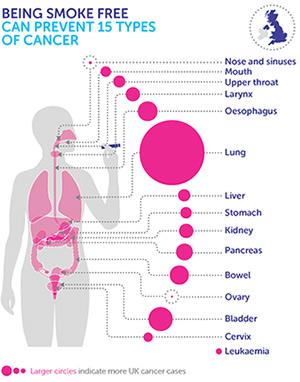Dyfi Valley Health, Bro Ddyfi Community Hospital, Heol Maengwyn, Machynlleth, Powys, SY20 8AD
contact.w96011@wales.nhs.uk 01654 702 224Dyfi Valley Health, Bro Ddyfi Community Hospital, Heol Maengwyn, Machynlleth, Powys, SY20 8AD
contact.w96011@wales.nhs.uk 01654 702 224
January. A month full of New Year Resolutions! If you smoke, wanting to quit is the best New Year’s Resolution you could pledge yourself. However, even with the best intentions, you may not quite get there…
This is why we have designed a few tips and tricks to help you. However, before we do… here are a few stats:

What health benefits are there to quitting smoking?
Nicotine and carbon monoxide levels in the blood reduce by half and your oxygen levels return to normal.
Carbon monoxide is eliminated from the body; lungs start to clear out mucus and other smoking debris.
There is no nicotine left in your body and the ability to taste and smell is greatly improved.
Breathing becomes easier. Bronchial tubes begin to relax and your energy levels should start to increase.
Circulation improves. Oxygenated blood is flowing around your body and helping to improve your health.
Coughs and wheezing improves and how well you can breathe increases by up to 10%.
Your risk of a heart attack falls to about half that of a smoker.
The risk of getting lung cancer falls to about half that of a smoker.
Your risk of a heart attack falls to the same as someone who has never smoked.
Of course, you do not HAVE to have support, but statistics show you are much more likely to quit smoking if you have support. You can get lots of information and advice here at Dyfi Valley Health or you can get support from other NHS providers free of charge:
Make a promise, set a date and stick to it. Sticking to the “not a drag” rule can really help.
Whenever you find yourself in difficulty, say to yourself, “I won’t even have a single drag”, and stick with this until the cravings pass.
Think ahead to times where it might be difficult (a party, for instance), and plan your actions and escape routes in advance.
A craving can last 5 minutes. Before you give up, make a list of 5-minute strategies.
For example, you could leave the party for a minute, dance or go to the bar.
And think about this: the combination of smoking and drinking raises your risk of mouth cancer by 38 times.
A review of scientific studies has proved exercise, even a 5-minute walk or stretch, cuts cravings and may help your brain produce anti-craving chemicals.
Nicotine replacement therapy (NRT) can double your chances of success.
As well as patches, there are tablets, lozenges, gum and a nasal spray. And if you like holding a cigarette, there are handheld products like the inhalator or e-cigarettes.
When you’re out, try putting your drink in the hand that usually holds a cigarette, or drink from a straw to keep your mouth busy.
Keep reminding yourself why you made the decision to give up. Make a list of the reasons and read it when you need support.
Links